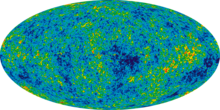
Back روبيرت اتش. ديك ARZ رابرت اچ دیک AZB রবার্ট হেনরী Bengali/Bangla Robert Henry Dicke Catalan Robert Henry Dicke Czech Robert Henry Dicke German Robert Henry Dicke Spanish رابرت اچ دیک FA Robert Dicke French Robert Henry Dicke Hungarian
Robert H. Dicke | |
|---|---|
| Born | Robert Henry Dicke May 6, 1916 St. Louis, Missouri, U.S. |
| Died | March 4, 1997 (aged 80) Princeton, New Jersey, U.S. |
| Nationality | American |
| Alma mater | Princeton University (B.S.) University of Rochester (Ph.D) |
| Known for | Inventor of the lock-in amplifier Dicke model Brans–Dicke theory Dicke effect Dicke radiometer Lamb Dicke regime |
| Spouse |
Annie Currie (m. 1942) |
| Children | 3 |
| Awards | National Medal of Science (1970) Comstock Prize in Physics (1973) Elliott Cresson Medal (1974) Beatrice M. Tinsley Prize (1992) |
| Scientific career | |
| Fields | Physics |
| Doctoral advisor | Lee Alvin DuBridge |
| Signature | |
 | |
| Part of a series on |
| Physical cosmology |
|---|
 |
Robert Henry Dicke (/ˈdɪki/; May 6, 1916 – March 4, 1997) was an American astronomer and physicist who made important contributions to the fields of astrophysics, atomic physics, cosmology and gravity.[1] He was the Albert Einstein Professor in Science at Princeton University (1975–1984).[2][3][4]
- ^ Happer, William; Peebles, James; Wilkinson, David (September 1997). "Obituary: Robert Henry Dicke". Physics Today. 50 (9): 92–94. Bibcode:1997PhT....50i..92H. doi:10.1063/1.881921.
- ^ "A Cosmic Journey: A History of Scientific Cosmology". history.aip.org. Retrieved December 24, 2022.
- ^ "Robert Dicke and atomic physics", Physics Matters, WORLD SCIENTIFIC, pp. 73–84, May 6, 2016, doi:10.1142/9789813142527_0007, ISBN 978-981-314-250-3, retrieved December 24, 2022
- ^ Archives, L. A. Times (March 6, 1997). "Robert Dicke; Theorized That Big Bang 'Echo' Still Resonates". Los Angeles Times. Retrieved December 24, 2022.